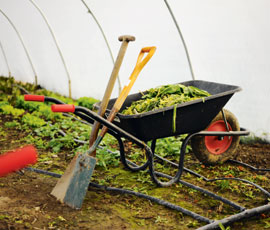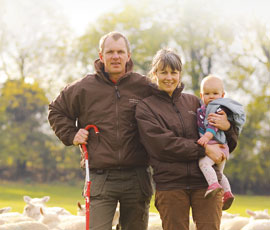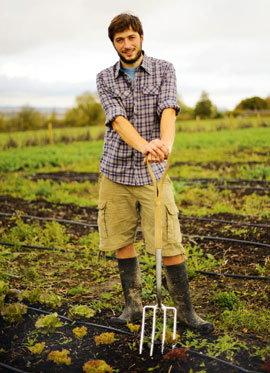Charity offers chance to get a foot on the ladder

Opportunities to run your own farm are few and far between for young people but a charitable trust in Oxfordshire has an innovative scheme that offers a much needed step on to the ladder. Jane King reports.
The Earth Trust, a charity operating on 1,200 acres near Abingdon in south Oxfordshire, has places available for new recruits to set up farms, green businesses or other land-based enterprises on low-cost tenancies in the next year.
This unique offer, called Farm Step, is specifically targeted at those who are locked out of farming due to lack of capital, the price of land and shortages in rural housing. It is designed to encourage prospective tenants to come forward with proposals, which fit in with the trust’s ethos around sustainable food production and distribution.
Farm Step is hoping to attract up to five newcomers to the scheme next year and up to 20 in the next five years. The Earth Trust is a new name for an established organisation, which was founded 45 years ago as the Northmoor Trust for Countryside Conservation following a generous endowment from Sir Martin and Audrey Wood.
In the last year, the Earth Trust estate has doubled in size due to the addition of North Farm in the autumn of 2010. The farmland includes arable and grazing for sheep and cattle as well as significant areas of woodland and an area dedicated to climate change forestry research. Areas of the site are Sites of Special Scientific Interest status and designated as one of the most important locations in Europe for wildlife. There is two-and-a-half miles of Thames frontage on site, plus community meadows, a wetland and lots of beautiful public open spaces.
In addition to farming, the Trust embraces education and has a visitor centre, café and exhibition. It’s approach is to support people to make changes in how they feel, think and act towards nature and the environment. A team of 30 people are employed, but the trust also has 100 regular volunteers and 750 supporters. Around 30,000 people each year take part in one of their annual activities such as the Children’s Food Festival.
The Earth Trust has a turnover of approximately £1.5m with most of its funds spent running the various sites, learning programmes, events and scientific research. The farming income is critical to the lifeblood of the trust as is the single farm payment and environmental stewardship money but funding has also come from lottery grants, local authority service contracts and donations.
Farm Step is a fairly new project but already there is a mix of small “green” businesses under way including a sheep flock, a salad company, a market garden, a Hereford cattle business, a honey producer and wood supplier. The project’s foundations lie in the management of the land and the skills needed to produce and distribute good food locally, minimising transport and waste and reducing the consumption and loss of carbon.
Farm Step businesses are practically and financially independent of the trust and the tenancy agreements are very favourable with the purpose of giving the new start ups a helping hand. Most tenancies last one to two years initially to ensure both parties have the option to opt out but the trust is flexible on length of tenure depending on the type of business proposed.
Jayne Manley, the director of the Earth Trust, believes they can offer a once in a lifetime opportunity for people to start their own farming enterprise.
“There are many people with the enthusiasm and determination to gain the skills, tools and knowledge that will enable us to live more sustainably in the future. If you are such a person, we would like to hear from you. Food – its production, distribution and healthy eating is a key theme at the Earth Trust.”
If you are interested in the initiative, you will need to present a credible business case when applying as potential Farm Step entrants are selected against three criteria:
Sustainable living
Does your business contribute to sustainable living? Will the farming techniques and the business model improve wildlife and will they represent clear environmental benefits in terms of minimising resource use and reduction in carbon emissions.
Linking people, food and farming
Will the farm system and business model bring people in surrounding communities into a closer relationship with land and with the people and processes associated with food production?
Earth Trust community
Does the business fit in well with other enterprises operating on the Earth Trust Farm? Does it increase the diversity of activities? Will it bring added benefits to existing enterprises and trust activities? Does it compete with Earth Trust activities or is it complementary? Will it increase the experiences the Earth Trust offers visitors?
If you are interested, call Chris Parker on 01865 409 416. Alternatively write to the Earth Trust with your proposal giving details of:
• Type of business you propose (eg vegetable growing, poultry, livestock…)
• Amount and type of land required
• How you will market your produce and business
• What benefits to the environment the business will bring
• Your commitment and experience
• How your green business idea fits with the criteria above
Case study: Camilla and Roly Puzey, Abingdon, Oxfordshire
 Camilla and Roly is a sheep enterprise with 300 breeding ewes on about 150ha owned by the trust. It is run by husband and wife team Camilla and Roly Puzey. They rent a cottage in the nearby village and have three children.
Camilla and Roly is a sheep enterprise with 300 breeding ewes on about 150ha owned by the trust. It is run by husband and wife team Camilla and Roly Puzey. They rent a cottage in the nearby village and have three children.
The couple have strong ideals about the future of farming and its impact on the environment. They believe in open farm access for schools and other interest groups and a localised approach to development of the business is crucial.
Their lamb is sold at local farmers markets, through mail order and direct to pubs, restaurants and shops across Oxfordshire. Their diversifications have proved popular and include birthday parties on site, selling sheepskin rugs and running a “Be a shepherd for the day” scheme.
The recession and too many farmers’ markets in Oxfordshire have hit lamb sales and the couple finds them exhausting to do but still financially worth it. Roly had no farming experience before joining the Earth Trust but was a strong advocate for linking farming with education and the environment as he previously worked for LEAF.
“What’s so important about Farm Step is your neighbours,” he added. “I have had so much wonderful help and support from everyone and that has been crucial to keeping us going. Farming can be lonely and it is hard. We are paying the bills but it is tight money-wise.”
For more information see http://www.camillaandroly.co.uk/
Case study: Matthew Loveday, The Little Salad Company, Wittenham, Oxfordshire
 Matthew Loveday started The Little Salad Company in March 2010 on just one hectare of land at Little Wittenham, Oxfordshire. He grew up in Leeds but moved to London as a young adult and got involved in community food growing in Islington by working for the local authority. He stumbled upon the Earth Trust while looking for a wedding venue and then started to explore the idea of leaving London and launching his own organic mixed salad enterprise by taking on a tenancy. The enterprise is not on a commercial scale yet and all salad plants are hand picked. Michael sells them for £7-8/kg wholesale and £12-15/kg direct to shoppers at farmers markets.
Matthew Loveday started The Little Salad Company in March 2010 on just one hectare of land at Little Wittenham, Oxfordshire. He grew up in Leeds but moved to London as a young adult and got involved in community food growing in Islington by working for the local authority. He stumbled upon the Earth Trust while looking for a wedding venue and then started to explore the idea of leaving London and launching his own organic mixed salad enterprise by taking on a tenancy. The enterprise is not on a commercial scale yet and all salad plants are hand picked. Michael sells them for £7-8/kg wholesale and £12-15/kg direct to shoppers at farmers markets.
“It’s all about the quality and people can distinguish between this and what is sold in supermarkets,” he said. “To start with, this is all about learning. I’m not intending to make money until year three. I love it because it’s being close to nature and being your own boss. You work harder but you are more driven because it’s self-employment. My passion is helping people understand there are alternatives to the food industry.”
Matthew, 29, still works part time for Islington Council in nature conservation and has the land at Wittenham on a two-year tenancy. He began with £5,000 start up costs.
Have your say on opportunities for young people to enter farming on our forum
